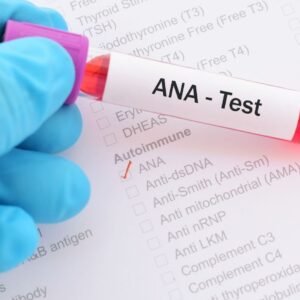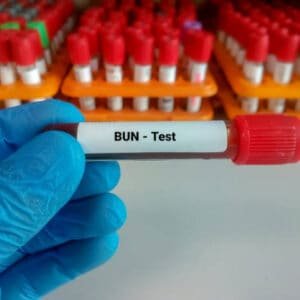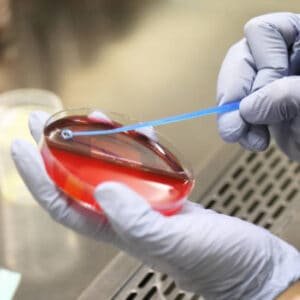Description
CBC (Hemogram 6 Part) Blood Test
What is the CBC test?
Complete Blood Count or CBC is a blood panel where the blood sample is tested to check your overall health. This test checks different components of the blood for variations in size and number. This test is also known as hemogram-6 part (diff) test. A CBC test usually evaluates RBC and related parameters, WBC (differential and absolute), and platelets.
What does the CBC test measure?
RBC: RBC or red blood cells carry oxygen and carbon dioxide.
Hemoglobin: Hb is the protein in red blood cells that holds oxygen.
MCH: Mean corpuscular hemoglobin is the amount of hemoglobin present in RBCs.
Hematocrit: This indicates the number of RBCs present in the blood.
MCV: Mean corpuscular volume gives the average size of RBCs.
MCHC: Mean corpuscular hemoglobin concentration is the amount of hemoglobin in a specific amount of blood. This is obtained by multiplying the hemoglobin result by 100 and then dividing it by the hematocrit value.
RDW: Red cell distribution width indicates the size of RBCs.
WBC: White blood cells are reported both, as a percentage and absolute values. They are differentiated into 5 types of cells. These include neutrophils, lymphocytes, monocytes, eosinophils, and basophils. They are responsible for fighting against infections and inflammation.
Platelets: These cells are responsible for clotting. Some lab tests measure mean platelet volume (MPV) and platelet distribution width (PDW).
Why do I need a CBC test?
Your doctor can ask you to get a CBC test done for various reasons:
As a part of your routine healthcare check-up– A full blood count gives a snapshot of the overall health of your blood and is a very commonly used test.To diagnose a medical condition– If you have symptoms such as fever, inflammation, fatigue, bruising, bleeding or an infection, your doctor will advise you to get a complete blood count done.
As a follow up on your existing medical condition– If you have a medical condition that affects your blood counts, your doctor will ask for periodic CBC testing to monitor your counts to make sure they are within acceptable limits.
To check how medical treatment is affecting your blood– If you are on certain medications like chemotherapy, you will be asked to undergo a complete blood test to check if your counts are within the normal range.
Do I need to fast before my CBC test?
The CBC test does not need fasting. You can either do this test on an empty stomach or after eating a meal. However, if your doctor has advised some other tests in addition to CBC, you may require to fast. Please check with your doctor or the lab technician.
How is a CBC test performed?
The CBC test is a blood test. The lab technician or phlebotomist will insert a sterile needle into your vein, usually at the bend of the elbow and draw out blood. It’s a quick and painless procedure, though some people might experience discomfort or develop bruising. The bruise subsides within a few days.
What is the price for a CBC test in India?
A cost of a CBC test depends on the lab you are getting it done from. In India, it can vary between Rs. 200/- to Rs 600/-, depending on the city and the diagnostic laboratory.
When will I get the CBC test results?
Most labs make the CBC test reports available in 24 hours.
What is the normal range, as per labs in India, for various parameters checked in CBC?
The reference range can slightly vary from lab to lab in India. So make sure you compare your values against the normal reference range as given in your lab report.
This table outlines how a typical CBC test report looks, along with the normal reference ranges for men and women.
| Test Name | Reference Range (Women) | Reference Range (Men) | Units |
| Hemoglobin (Hb) | 11.6-15 | 13.2-16.6 | grams/dL |
| Packed Cell Volume (PCV) | 3.92-5.13 | 4.32-5.72 | percentile |
| RBC Count | 4.2-5.4 | 6.1-7.1 | million cells/mcL |
| Mean Corpuscular Volume (MCV) | 80-96 | 80-96 | fL/red cell |
| Mean Corpuscular Hemoglobin (MCH) | 27.5-33.2 | 27.5-33.2 | picograms |
| Mean Corpuscular Hemoglobin Concentration (MCHC) | 33.4-35.5 | 33.4-35.5 | g/dL |
| Red Cell Distribution Width (RDW) | |||
| Hematocrit | 35.5-44.9 | 38.3-48.6 | % |
| Platelet Count | 150,000-450,000 | 150,000-450,000 | /mcL |
| Mean Platelet Volume (MPV) | |||
| Total Leukocyte Count (TLC) | 3,400-9,600 | 3,400-9,600 | cells/mcL |
| Differential Leucocyte Count (DLC) | |||
| Segmented Neutrophils | 33-73 | 33-73 | % |
| Lymphocytes | 13-52 | 13-52 | % |
| Monocytes | 0-10 | 0-10 | % |
| Eosinophils | 0-5 | 0-5 | % |
| Basophils | 0-2 | 0-2 | % |
| Absolute Leucocyte Count | |||
| Neutrophils | 1.8-7.8 | 1.8-7.8 | k/mcL |
| Lymphocytes | 1.0-4.8 | 1.0-4.8 | k/mcL |
| Monocytes | 0-0.8 | 0-0.8 | k/mcL |
| Eosinophils | 0-0.45 | 0-0.45 | k/mcL |
| Basophils | 0-0.2 | 0-0.2 | k/mcL |
What do the results of the hemogram-6 part (diff) test mean?
CBC test results allow the doctor to interpret the health of your blood cells. The possible conditions that an abnormal CBC report can point towards are explained in detail below.
Red blood cells, Hb and hematocrit
If your RBC is lower than the reference range, it is indicative of anemia. Anemia is generally caused by low iron levels, deficiency of certain vitamins, blood loss, congenital heart disease or an underlying condition.
A high count RBC is called erythrocytosis. This occurs in myeloproliferative disorders such as polycythemia vera and myelofibrosis. These are slow-growing blood cancers where the bone marrow produces a large number of abnormal blood cells (RBC, WBC, and platelets).
A high hematocrit could indicate that you are dehydrated or have another underlying medical condition.
A high MCV means your RBCs are bigger than the normal size. This could be due to vitamin B12 or folate deficiency.
White blood cells
A low WBC count (leukopenia) can indicate bone marrow problems, autoimmune disorders or certain cancers. Some medications can also lower your WBC count.
A high WBC count (leukemia) indicates the presence of infection or inflammation in the body. Certain immune disorders, autoimmune disorders, and medications can also lead to a high WBC count.
Neutrophils, the most common white blood cells in adults, are responsible for fighting against bacterial and some viral infections. Higher levels of neutrophils can indicate acute infection or myeloproliferative disorders.
A low neutrophil count (neutropenia) can cause immunosuppression.
Lymphocytes go up in certain lymphocytic leukemias such as chronic lymphocytic leukemia (CLL) and some viral infections such as glandular fever.
A low lymphocyte count occurs in HIV infections.
A high monocyte count is indicative of certain bacterial infections.
Eosinophils go up if you have an allergic reaction, asthma or parasitic infection.
High basophils can indicate bone marrow disorders.
Platelets
Low platelet counts (thrombocytopenia) or high platelet counts (thrombocytosis) can be caused by certain medical conditions or medications.
What else do I need to know before I test my hemogram-6 part (diff) ?
CBC test results are not definitive. They are usually correlated clinically with your symptoms. If the CBC values are slightly outside the normal reference ranges, but you are healthy and do not have any symptoms, your doctor may choose to accept those results as normal and will not ask you to conduct more diagnostic tests. But, if they suspect a problem, they may ask you to repeat the tests at a later date or ask for other follow-up blood tests to be done.
Is the hemogram-6 part (diff) test prescribed during pregnancy?
A CBC test is one of the first test recommended during pregnancy. It’s done in the first 12 weeks of pregnancy. It helps the doctor check for conditions like anemia or any other underlying conditions the pregnant woman may have. The American College of Obstetricians and Gynecologists strongly recommend a CBC test during pregnancy. If this test indicates the presence of anemia, the doctor can prescribe iron supplements. This test also helps rule out any infections that could be harmful to the baby. Therefore this is a very important test to be carried out during pregnancy.
How is the CBC test performed on infants?
Newborn babies have weak immune defenses and can catch an infection soon. But they also respond to antibiotics very fast. A CBC test for babies is done if the doctor is suspecting an infection.
This is done by inserting the needle into the heel of the baby and squeezing the heel to draw out blood.
Can a CBC test be used to test drugs?
No, a CBC test cannot be used to test for drugs. This test gives you a complete profile of RBCs, WBCs, and platelets, and is mainly used to detect infection and/or inflammation. Drugs are detected via toxicological tests which mostly involve hair and urine analysis.
Does a CBC test reveal the blood group?
As the name suggests, this test measures the complete blood count, which is, the count of each type of blood cell. It does not reveal any information on what is the blood group.
How long does it take to undergo a CBC test?
This is a simple procedure and doesn’t take more than a few minutes. It basically involves drawing a small sample of blood from the vein.
Are there any risks or side-effects of CBC test?
This is a simple and safe procedure with zero to negligible risks and side-effects. The only side-effect, if any, is observed at the site where the needle is inserted. There may be a tiny bump or bruise at the site and might cause a slight stinging sensation.
My CBC results are not normal. What should I do?
In case your CBC count is not normal, you should undergo further tests as prescribed by your doctor. Further blood tests will reveal what exact issue you have. You must follow the complete treatment procedure as directed by your doctor to bounce back to health.






Reviews
There are no reviews yet.